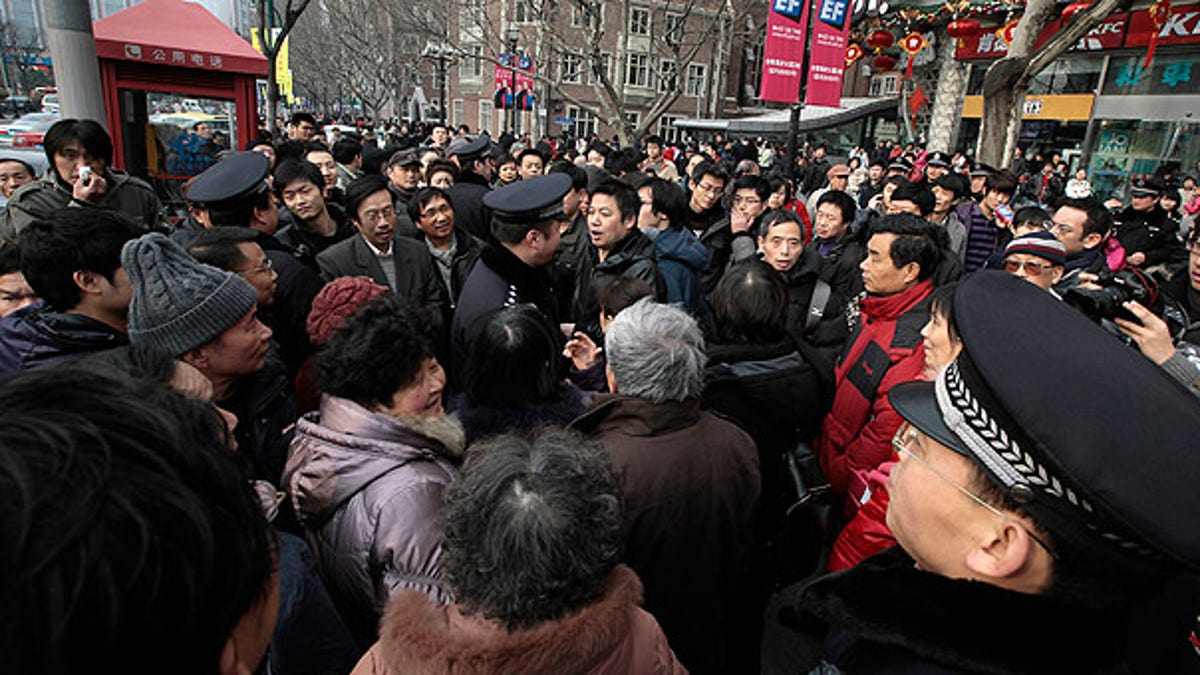
Feb. 20: Police officers urge people to leave as they gather in front of a cinema that was a planned protest site in Shanghai, China. (AP2011)
BEIJING – Jittery Chinese authorities staged a show of force Sunday to squelch a mysterious online call for a "Jasmine Revolution" apparently modeled after pro-democracy demonstrations sweeping the Middle East.
Authorities detained activists, increased the number of police on the streets and censored online calls to stage protests in Beijing, Shanghai and 11 other major cities. Citizens were urged to shout "We want food, we want work, we want housing, we want fairness" — a slogan that highlights common complaints among ordinary Chinese.
Many activists said they didn't know who was behind the campaign and weren't sure what to make of the call to protest, which was first posted on the U.S.-based Chinese-language advocacy website Boxun.com.
China's authoritarian government has appeared unnerved by recent protests in Egypt, Tunisia, Bahrain, Yemen, Algeria and Libya. It has limited media reports about them, stressing the instability caused by protests in Egypt, and restricted Internet searches to keep people uninformed.
The call to protest in China did not seem to garner much traction among citizens. In Beijing, 25-year-old Liu Xiaobai was stopped by police after he placed a white jasmine flower on a planter in front of a McDonald's restaurant that was the planned protest site and took some photos with his cell phone.
"I'm quite scared because they took away my phone. I just put down some white flowers, what's wrong with that?" Liu said. "I'm just a normal citizen and I just want peace."
Security agents tried to take Liu away, but he was swarmed by journalists and eventually was seen walking away with a friend.
Two other people were taken away by police, including a shabbily dressed old man who was cursing and shouting, though it wasn't clear if he was there because of the online call to protest.
Any potential protesters were far outnumbered by hundreds of rubberneckers at the busy Wangfujing pedestrian mall, who wondered if there was a celebrity in the area because of the heavy police presence and dozens of foreign journalists and news cameras.
In Shanghai, three people were taken away by police after scuffling in front of a Starbucks coffee shop in what appeared to be an attempt to attract attention. They were not holding placards and their intentions were unclear.
There were no reports of protests in other cities where people were urged to gather, such as Guangzhou, Tianjin, Wuhan and Chengdu.
Ahead of the planned protests, more than 100 activists in cities across China were taken away by police, confined to their homes or were missing, the Hong Kong-based group Information Center for Human Rights and Democracy said. Families and friends reported the detention or harassment of several dissidents, and some activists said they were warned not to participate.
On Sunday, searches for "jasmine" were blocked on China's largest Twitter-like microblog, and status updates with the word on popular Chinese social networking site Renren.com were met with an error message and a warning to refrain from postings with "political, sensitive ... or other inappropriate content."
Mass text messaging service was unavailable in Beijing due to "technical issues," according to a customer service operator for leading provider China Mobile. In the past, Chinese authorities have suspended text messaging in politically tense areas to prevent organizing.
Boxun.com said its website was attacked by hackers Saturday after it posted the call to protest. A temporary site, on which users were reporting heavy police presence in several cities, was up and running Sunday. The site said in a statement it had no way of verifying the origins of the campaign.
The call for a Jasmine Revolution came as President Hu Jintao gave a speech to top leaders Saturday, asking them to "solve prominent problems which might harm the harmony and stability of the society." Hu told the senior politicians and officials to provide better social services to people and improve management of information on the Internet "to guide public opinion," the official Xinhua News Agency reported.
The ruling Communist Party is dogged by the threat of social unrest over rising food and housing prices and other issues. In the latest increase, the National Development and Reform Commission announced Saturday that gasoline and diesel prices would rise 350 yuan ($53) per ton.
Tensions were already high in recent days after a video secretly made under house arrest by one of China's best-known activist lawyers, Chen Guangcheng, was made public. Chen and his wife were reportedly beaten in response, and some of Chen's supporters said they were detained or beaten by authorities after meeting to discuss his case.
___
Associated Press writers Cara Anna and Charles Hutzler in Beijing and Elaine Kurtenbach in Shanghai contributed to this report.








































